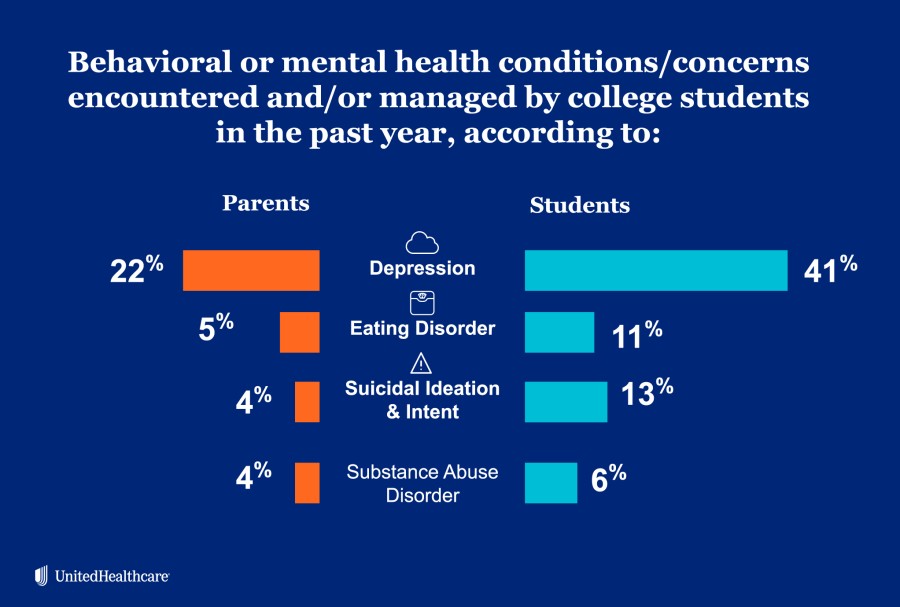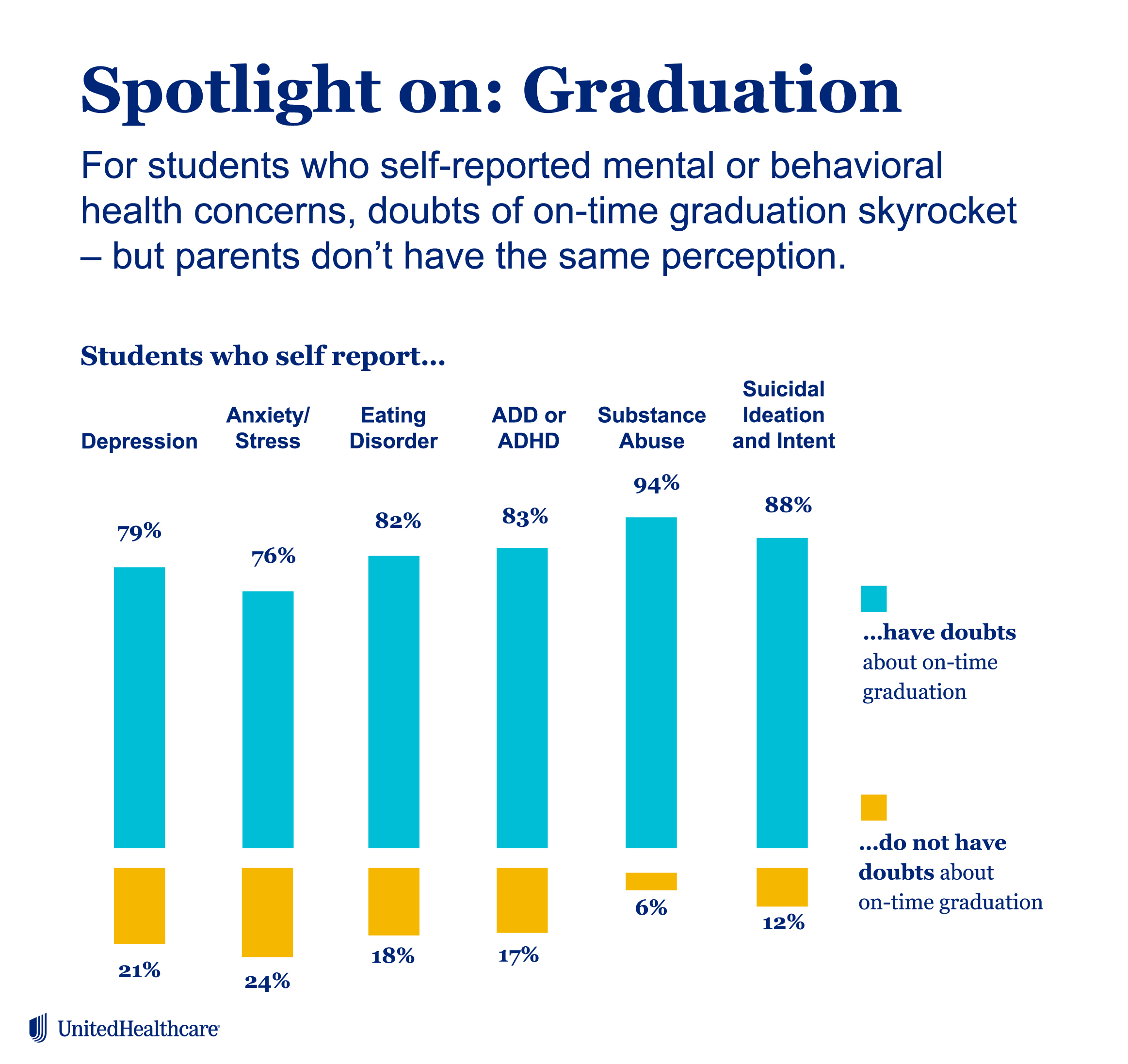MINNETONKA, Minn. / Mar 22, 2023 / Business Wire / UnitedHealthcare today announced new survey findings revealing college students are more likely to report they or a roommate or friend have encountered mental or behavioral health concerns over the past year, compared to what parents report knowing about their college-age children.
The survey also found gaps in awareness among college students regarding how to access mental and behavioral health care, uncovered student misconceptions about cost and ease of access for these services, and showed a correlation between students’ self-reported mental health concerns and doubts about on-time graduation.
The survey found students are self-reporting that they or a roommate or friend encountered mental or behavioral health concerns in the past year – including anxiety (55%), depression (41%) and eating disorders (11%) – and 15% of those students who have not sought help for behavioral or mental health concerns say it’s because they don’t know how to access on-campus behavioral and mental health services. Of particular concern, suicidal ideation and intent was self-reported by 13% of student respondents.
“It may not be surprising that some students and parents have different perceptions of the college experience, but this report demonstrates the need to create environments for ongoing meaningful conversations with these emerging adults,” said Dr. Donald Tavakoli, national medical director for behavioral health, UnitedHealthcare. “We need to work with students to educate them on their options for mental and behavioral support. Colleges, parents, health care providers and health plans all can play a role in supporting navigation to appropriate care.”
Commissioned by UnitedHealthcare and conducted by YouGov, “The College Student Behavioral Health Report” surveyed a total sample of 1,034 Americans, of whom 506 were college students, and 528 were parents of college students, enrolled in an institution of higher education across the country.
Data reveal college students may be struggling with more than typical exam stress – and parents may underestimate the frequency of serious mental health concerns.
Student respondents self-reported that they or a roommate or friend encountered potentially life-threatening mental or behavioral health concerns during the past year, including depression, eating disorders and suicidal ideation and intent, but survey data indicate that parents may not always be aware. For example:
Of particular note, 13% of students self-reported they encountered or managed suicidal ideation and intent, while only 4% of parents said their students had this experience.
Students cite barriers to accessing mental or behavioral health care.
When asked why students did not seek mental or behavioral care, among those not seeking it, parents were more likely than students (73% versus 49%) to say it was because their children did not need mental or behavioral health support. In contrast, students self-reported they did not seek help for reasons that point to perceptions around cost, difficulty in getting appointments and a lack of knowledge about where to access resources. Survey results showed:
Mental or behavioral health concerns may be linked to doubts about graduating on time.
For students who encountered mental or behavioral health concerns during the past year, survey results showed increased rates of doubts about on-time graduation – particularly among those whose self-reported concerns may be life-threatening, such as suicidal ideation and intent (88% doubt their ability to graduate on time), eating disorders (82% doubt their ability to graduate on time), or depression (79% doubt their ability to graduate on time). In contrast, only 30% of students who did not self-report encountering mental or behavioral health concerns in the past year doubt their ability to graduate on time.
Solutions may include increased communication among students, families, colleges and providers.
“Recognizing that college students may be facing more than just stress about schoolwork is an important first step in encouraging dialogue and increasing support. It’s critical that colleges, families, providers and health plans work together to provide resources and support to students where and when they need it,” added Dr. Tavakoli.
Steps toward reducing barriers to care, both real and perceived, may include:
In addition to advocacy and resources for mental health programs, UnitedHealthcare offers helpful parent and youth “conversation starter cards” that are designed to help parents talk to their kids about mental well-being and that try to spark conversations that move past one-word answers.
For more information about behavioral health resources, visit UHC.com.
About UnitedHealthcare
UnitedHealthcare is dedicated to helping people live healthier lives and making the health system work better for everyone by simplifying the health care experience, meeting consumer health and wellness needs, and sustaining trusted relationships with care providers. In the United States, UnitedHealthcare offers the full spectrum of health benefit programs for individuals, employers, and Medicare and Medicaid beneficiaries, and contracts directly with more than 1.6 million physicians and care professionals, and 8,000 hospitals and other care facilities nationwide. The company also provides health benefits and delivers care to people through owned and operated health care facilities in South America. UnitedHealthcare is one of the businesses of UnitedHealth Group (NYSE: UNH), a diversified health care company. For more information, visit UnitedHealthcare at www.uhc.com or follow @UHC on Twitter.
About The College Student Behavioral Health Report
All figures, unless otherwise stated, are from YouGov Plc. Total sample size was 1,034, of whom 528 were parents of college students and 506 were college students currently enrolled in an institution of higher education across the country. Fieldwork was undertaken between August 8 and August 14, 2022. The survey was carried out online.


| Last Trade: | US$503.76 |
| Daily Change: | -2.58 -0.51 |
| Daily Volume: | 764,794 |
| Market Cap: | US$463.600B |
October 15, 2024 July 16, 2024 May 23, 2024 September 12, 2023 August 17, 2023 | |

Astria Therapeutics is a biopharmaceutical company, and our mission is to bring life-changing therapies to patients and families affected by rare and niche allergic and immunological diseases. Our lead program, STAR-0215, is a monoclonal antibody inhibitor of plasma kallikrein in clinical development...
CLICK TO LEARN MORE
Chimerix is on a mission to develop medicines that meaningfully improve and extend the lives of patients facing deadly diseases. The company is devoted to filling gaps in the treatment paradigm. Chimerix’s most advanced clinical-stage program is in development for H3 K27M-mutant glioma....
CLICK TO LEARN MOREEnd of content
No more pages to load
COPYRIGHT ©2023 HEALTH STOCKS HUB